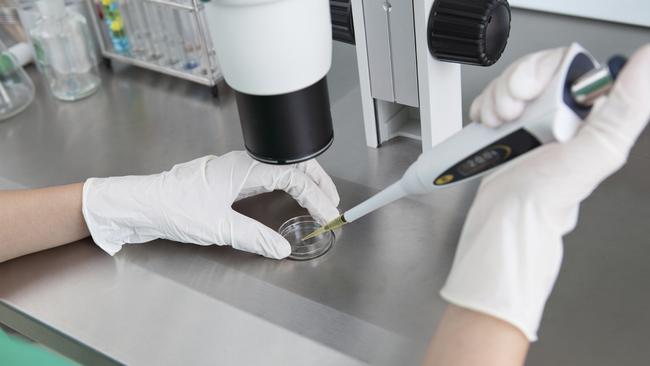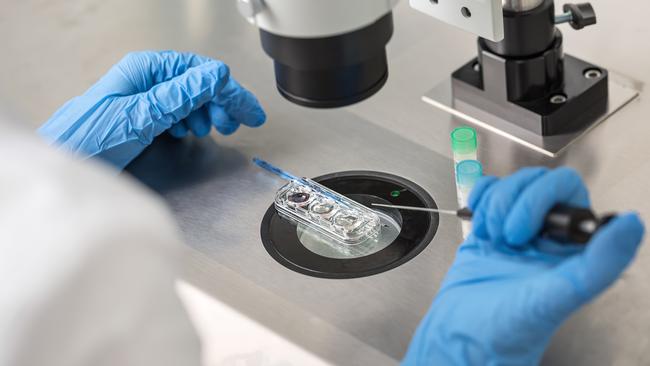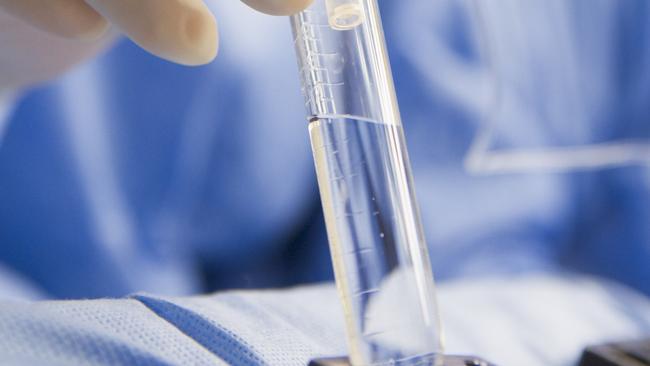IVF families blocked from own embryos in cruel twist
IVF families have been blocked from their own embryos because they do not comply with reforms enacted after they were created.

Fertility
Don't miss out on the headlines from Fertility. Followed categories will be added to My News.
Heartbroken IVF families have been told they cannot use embryos they created with donors after an international sperm bank refused to release key donor details to comply with new Australian regulations.
New fertility laws introduced in Queensland in September means all donors must now provide their contact details so that any donor-conceived child can request contact after the age of 18 years.
It is this new IVF reform that has left at least 11 Queensland families in limbo as the law requires clinics to have obtained a donor’s contact details before beginning treatment with their genetic material.
But sources say the American sperm bank Xytex has refused to provide the essential information for donor sperm that patients had already purchased — and used to create embryos — prior to the changes.
At least one major IVF provider has written to patients to inform them they cannot access their donated sperm and donor-created embryos without the required donor details.
While some international sperm banks have provided updated donor information, Xytex has not.

It has provided donor sperm to patients at several fertility providers including Monash IVF.
A Monash IVF Group spokeswoman said in a statement the matter would be resolved immediately if the US supplier of the donated material provided the information needed to meet the requirements of the Queensland legislation.
“We have written to them seeking this information and we again urge them to provide it,” the spokesman said.
“We are aware that this issue may also apply to patients who use other assisted reproductive treatment providers in Queensland.
“Monash IVF continues to act in accordance with the 2024 Queensland Assisted Reproductive Technology Act.
“We have directly contacted our 11 patients who are impacted by this and we will continue to provide them support in accordance with their individual needs.”
Peak IVF body the Fertility Society for Australia and New Zealand said they were “aware of issues faced by some patients in relation to legislative changes in the state of Queensland”.
“Issues such as this again highlight the need for a national approach to how we manage assisted reproductive therapies in Australia,” a spokeswoman said.
A report, commissioned by FSANZ last year and revealed by the Herald Sun, warned Australia’s IVF sector was overseen by patchwork regulation and needed national uniformity.

In a letter sent to an affected patient and seen by the Herald Sun, Monash IVF said they “historically” were not provided the contact information for donors who were recruited via international sperm banks and Xytex had since declined to provide this information.
“The Queensland Chief Health Officer has confirmed that we would be in breach of the legislation if we were to provide treatment without first obtaining this additional information,” the letter said.
“Recognising the potential legal consequences of failure to comply with the act, Monash IVF has made the difficult, but necessary decision to cease treatment cycles where the mandated information is not available.
“This applies to all stored donor sperm, eggs and embryos, or embryos previously created with donated sperm.”
The letter listed the Queensland Health Minister’s contact details for patients to “express your concerns and advocate for legislative change”.
“Monash IVF has written to the Queensland Health Minister to highlight this challenging scenario and advocate for patients impacted by the new legislative requirements by asking them to amend the part of the Act.
“Monash IVF believes that it is very unfair to apply these new requirements retrospectively to material obtained or created prior to the legislation coming into effect and recognises the profound and immediate consequences for patients.”
A spokesman for Queensland Fertility Group (QFG) said it was aware that recent legislative changes in Queensland may impact patients who had previously accessed donor sperm from Xytex and that Xytex had since confirmed compliance with the updated legislative requirements for new donors.
“We have been seeking further clarification from Queensland Health on how the updated legislation may affect continued access to previously selected donors for patients wishing to extend their families. QFG remains committed to supporting our patients and advocating for their reproductive choices,” the spokesman said.
“We understand that this period of uncertainty may be distressing, and we encourage any patients who believe they may be affected to contact QFG for guidance and access to supportive counselling. Patients may also wish to seek further clarification directly from Xytex or Queensland Health regarding their individual circumstances.”
Queensland Health said it had been working closely with providers to understand their concerns about compliance with the new laws.
“Queensland Health has consistently communicated the government’s approach will focus on education rather than enforcement while Queensland Health explores amendments to address concerns raised by providers,” a spokesperson said.
Xytex was contacted for comment.
The news comes just weeks after the Herald Sun revealed a catastrophic embryo mix-up at Monash IVF’s Brisbane clinic led to a woman being implanted with a stranger’s embryo.


